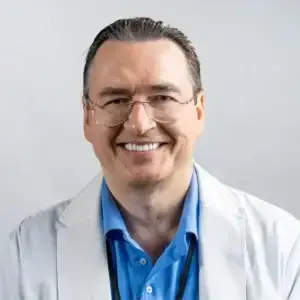

Dr. Rostislav Ignatov, MD
Chief Medical Officer
Born in 1989 to actor Tim Healy and TV presenter Denise Welch, Matty Healy grew up surrounded by the arts. He co-founded The 1975 in his teens, gaining fame with their 2013 debut album. The band’s success was marked by hit songs and a distinctive genre-blending sound.
Healy began using heroin in 2014, escalating to a serious addiction by 2018. His drug use strained personal relationships, affected his mental health, and disrupted musical projects. Public scrutiny and media speculation added further pressure.
Prompted by an intervention during the recording of their third album, Healy entered rehab in Barbados in 2017. With support from friends, family, and professionals, he committed to sobriety and made lifestyle changes to support his recovery.
Post-rehab, Healy returned to music with renewed creativity and emotional depth. He now uses his platform to openly discuss addiction, advocate for recovery, and inspire fans facing similar struggles.
Matty Healy has faced a significant personal battle with heroin addiction, impacting various aspects of his life. This article covers:
Heroin addiction can destroy careers and relationships, but with professional treatment and support, recovery is possible. Our heroin addiction treatment programs offer medically supervised detox to safely manage withdrawal, followed by medication-assisted treatment and inpatient rehabilitation to address the physical and psychological aspects of heroin dependence. For those with co-occurring mental health conditions, we provide integrated dual diagnosis treatment that addresses both addiction and mental health together. Treatment is available at our facilities in Arizona, Arkansas, Florida, Massachusetts, New Jersey, and Puerto Rico. Find out if your insurance covers heroin treatment or explore our insurance resources to understand your coverage options. Contact our admissions team to begin your recovery journey from heroin addiction, just as others have successfully done.
Matty Healy, born Matthew Healy in 1989, comes from a family deeply rooted in the arts. His father, Tim Healy, is a famous actor, and his mother, Denise Welch, is a popular actress and TV presenter. Growing up in a creative environment, Matty was exposed to the world of entertainment from an early age.
In his teenage years, Matty Healy, along with his high school friends Adam Hann, George Daniel, and Ross MacDonald, formed the band The 1975. The group started by playing small local gigs and developing their unique sound. Their dedication paid off as they began to gain a following.
The 1975’s debut album, released in 2013, was a huge success, earning them a growing fan base and critical acclaim. With subsequent albums and hit singles, Matty Healy and his bandmates solidified their place in the music world, becoming one of the most popular and influential bands of their time.
It was in 2014 when Healy started using heroin after concerts, which marked the beginning of his struggle. He abused various drugs, including marijuana and prescription opioids. In a recent interview with Billboard, Healy said that the thing that triggered his habit the most was the sense of being alone.
Healy’s heroin use escalated over time, leading to a drug-fueled outburst in 2018. This incident prompted an intervention from his bandmates. Despite his efforts to manage his addiction, his dependency on heroin and other drugs created significant personal and professional challenges.
As Matty Healy’s addiction became more apparent, the public and media began to speculate about his struggles. While some attention was supportive, much of it was invasive and judgmental. This scrutiny added pressure, making his path to recovery even more challenging.
After completing his rehabilitation, Matty Healy faced the challenges of life in recovery. Here’s a look at how he has moved forward.
Healy’s path to sobriety has been both demanding and rewarding. Staying clean from heroin requires ongoing effort and commitment. Healy has worked hard to maintain his sobriety through support groups and personal discipline. Each day is a step toward a healthier and more balanced life.
Post-rehabilitation, Healy made notable changes to his lifestyle. He focused on healthier living, including better nutrition and exercise. He also avoided environments that could trigger old habits. These changes helped him stay focused on his recovery and improve his overall well-being.
Healy’s return to music marked a fresh start in his career. His experiences with addiction have influenced his creative process and songwriting. He now brings a new depth and honesty to his songs. His comeback has been well-received, showing how his personal growth has enriched his art.
Healy has worked hard to maintain his sobriety through support groups and personal discipline.
Matty Healy’s battle with addiction led him to seek help and go through rehabilitation. Here’s an overview of his journey towards recovery.
During dinner at the start of recording their third album, A Brief Inquiry Into Online Relationships, Healy, high on benzodiazepines, refused to stop using heroin despite his band’s pleas. The next morning, he apologized to drummer George and acknowledged his need for rehab.
The rehabilitation process for Healy involved several steps. He entered a rehab facility in Barbados in 2017, where he received medical care and therapy. This period focused on detoxification, counseling, and learning coping strategies.
“Often, when you get to rehab, you meet a selection of people who’ve lost everything,” Healy told Zane Lowe for Apple Music. “And losing everything elicited this desire to change their lives. Now, when I got to rehab, I realized I’d not lost anything. I’d nearly lost the respect of everybody I loved. But I hadn’t. Hadn’t lost my career, hadn’t lost my possessions, hadn’t lost my money.”
Throughout his recovery, Healy relied on support systems and networks. Family members, best friends, and professional counselors played a vital role in his healing process. Their encouragement and understanding helped him stay focused on his recovery goals and navigate the difficult times.
Get answers about your cost / coverage now.
Your information will be kept private
Let’s talk about what’s going on — no judgment. (We’ve been there before ourselves). No one will know you inquired and there is no commitment to call.
24/7 Support
No Commitment
100% Private
There’s no catch. Checking your insurance is simply a way to see what your plan covers — it doesn’t lock you into treatment, notify anyone, or cost you anything. You get answers upfront to decide what makes sense for you.
Protecting your privacy matters! No information or notifications are ever sent to your employer or family — whether you check your insurance online or call. Everything is handled through secure, encrypted systems that meet strict medical privacy laws. You stay in control of your information!
Luckily, most insurance policies cover treatment here. Depending on the healthcare you’ve already had this year, costs could even be zero. Instead of worrying, let’s just find out what your plan covers.
Most likely. We work with major providers like Cigna, Aetna, and United Healthcare, public insurances like Tricare and tribal plans, and even smaller plans like Surest Bind and Harvard Pilgrim. The quickest way to know for sure is to check online or call. It’s a quick, private way to understand what is covered upfront.
Verifying your insurance isn’t a commitment to start treatment — it’s simply a way to see what your options are. Knowing your coverage ahead of time helps you make more informed, confident decisions. It also helps flag a spot, so you’re able to get right in if you ever do decide you’re ready.
You need your policy number to check your specific policy online. If you want general information, just call. You likely have questions beyond insurance anyway. Reaching out now helps you figure out the right fit if or when you’re ready. You don’t have to put off the call until you’re in crisis. Calling is not scary, I promise!